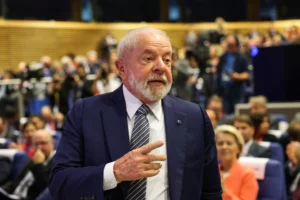(Analysis) The Brazilian Real has significantly weakened since the beginning of the year, culminating in the dollar peaking at R$5.268 on Tuesday, April 16.
Economists attribute this trend to global risk aversion, which complicates the economic landscape for President Lula’s administration.
Initially, in early 2024, the dollar was trading below R$4.90. However, strong economic data from the U.S. shifted expectations about the Federal Reserve’s interest rate strategies, contributing to a rising dollar.
This situation was exacerbated by increased tensions in the Middle East and shifts in Brazil’s fiscal policies, pushing the dollar to its highest rate of the year.
This upward trajectory of the dollar is set to inflate the costs of food and fuel, with these increases expected to be transferred to Brazilian consumers.

Accordingly, BNP Paribas has updated its end-of-year forecast for Brazil’s benchmark interest rate, the Selic, increasing it from 9.0% to 9.5%
Felipe Salto from Warren Investimentos also predicts a deceleration in the Central Bank of Brazil’s rate-cutting measures, considering international influences like U.S. monetary policy and regional instabilities.

